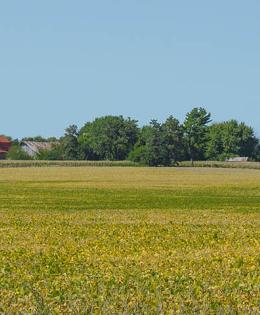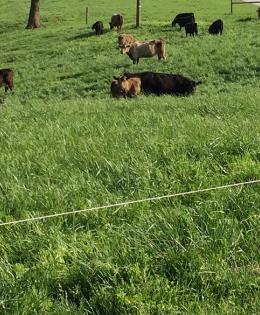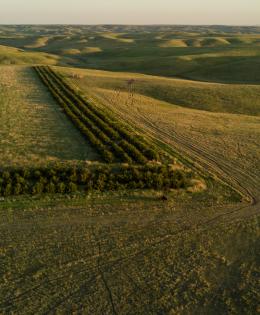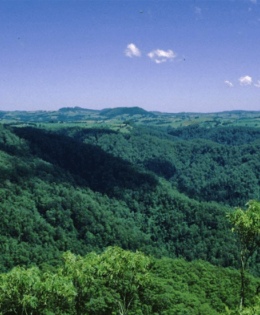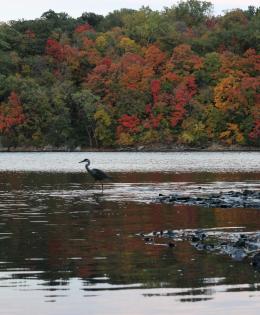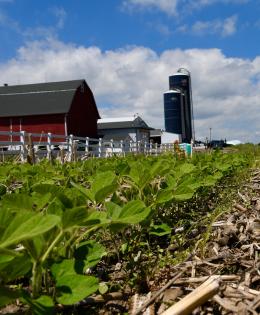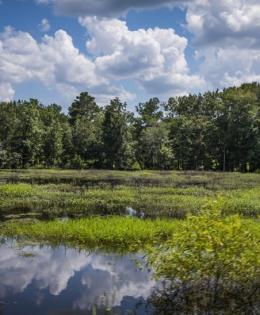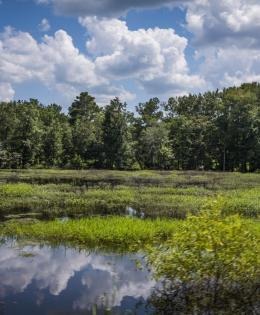
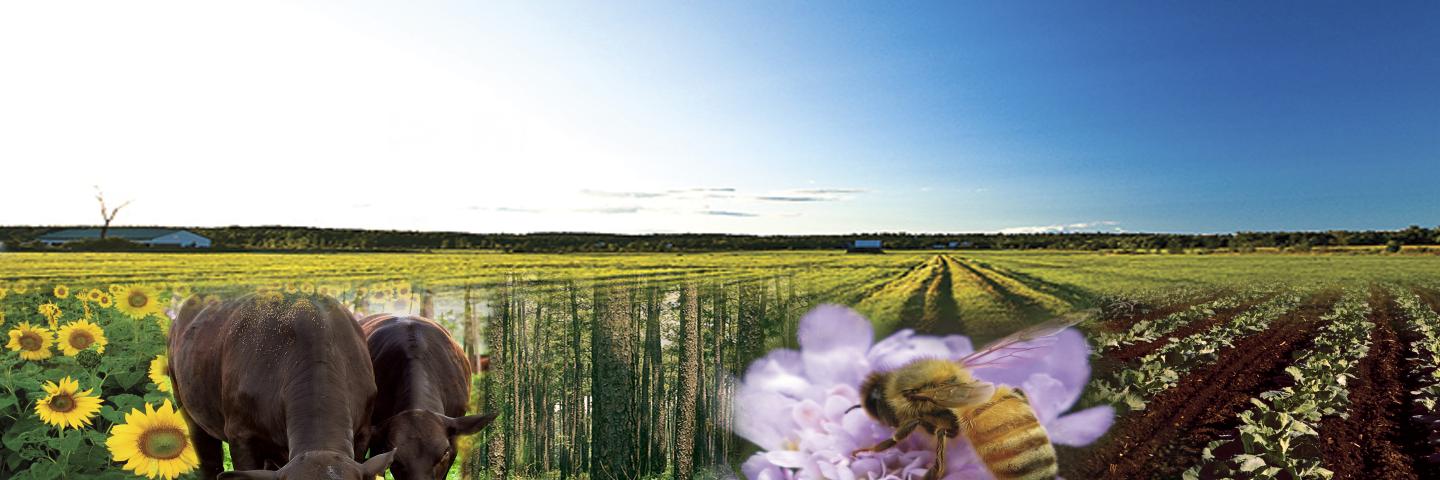
Welcome to the new Mississippi Natural Resources Conservation Service (NRCS) website! The tabs at the top of the page are linked to the general NRCS information. For Mississippi's specific information, continue scrolling down the page.
Mississippi NRCS QUICK LINKS
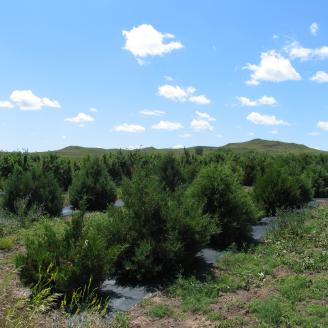
About NRCS
For more than 80 years, we have helped people make investments in their operations and local communities to keep working lands working, boost rural economies, increase the competitiveness of American agriculture, and improve the quality of our air, water, soil, and habitat.
- Our Mission: We deliver conservation solutions so agricultural producers can protect natural resources and feed a growing world.
- Our Vision: A world of clean and abundant water, healthy soils, resilient landscapes, and thriving agricultural communities through voluntary conservation.
Who We Are
- Mississippi USDA-NRCS helps protect producers and conserve our valuable natural resources, which services all 82 counties across the state while drawing on the history of helping people help the land.
- Mississippi USDA-NRCS also closely partnered with farmers and ranchers, local and state governments, and other federal agencies to maintain healthy and productive working landscapes.
What We Do
We provide services to all private landowners interested in restoring and enhancing our sprawling landscape through a unique partnership with landowners, conservation districts, state and local governments, and rural and urban citizens.
- NRCS provides one-on-one, personal advice on the best solutions to meet the unique conservation and business goals of those who grow our nation's food and fiber.
- NRCS helps people invest in their operations and local communities to keep working lands working, boost rural economies, increase the competitiveness of American agriculture, and improve the health of our air, water, soil, and habitat.
- NRCS generates, manages, and shares the data, technology, and standards that enable partners and policymakers to make decisions informed by objective, reliable science.

Mississippi's Ranking Dates
The Mississippi Natural Resources Conservation Service has a proud history of supporting America's farmers, ranchers, and forest landowners.
NRCS accepts applications year-round. Apply by your state's ranking dates to be considered for funding in the current cycle. Funding is provided through a competitive process. If you apply after the program ranking date, NRCS will automatically consider your application during the next cycle.
Ranking Dates
- ACEP – October 31, 2025
- CSP – October 31, 2025
- EQIP – October 31, 2025
More information regarding Ranking Dates
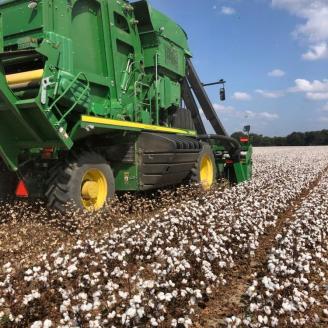
Directory and Annual Report

Apply Today with NRCS Mississippi!
Welcome to My NRCS Career!
Apply Today!
www.usajobs.gov
Whether you are an established NRCS employee looking for career path information or you are browsing potential careers with NRCS for the first time, this website will provide the information you are seeking. You can:
- Learn about life at NRCS Federal employment, or current job openings with NRCS
- Plan your career using career maps and career guide information for NRCS occupations.
- Learn about our current employment programs for students and recent graduates.
-
Student and Recent Graduate Programs
Welcome to the NRCS Students and Recent Graduates information center! This is your one-stop site for information about student and recent graduate opportunities at NRCS. We offer internships for high school students and degree-seeking undergraduate and graduate students studying agricultural and natural resources-related fields such as plant pathology, agronomy, range science, soil science, forestry, ecology, botany, biology, civil and agricultural engineering. We also offer programs for recent graduates from qualifying institutions. Please find information regarding your eligibility below.
Pathways Programs
The Pathways Programs offer clear paths to opportunities with NRCS for students from high school through post-graduate school. The Pathways Programs consist of the Internship Program, the Recent Graduates Program, and the Presidential Management Fellows (PMF) Program.
Internship Program
This program is targeted at current students and individuals accepted for enrollment in a qualifying educational program. This program provides students enrolled in a variety of educational institutions, with paid opportunities to work in agencies and explore Federal careers while still in school.
The Recent Graduate program targets individuals who have recently graduated from qualifying educational institutions or programs. Eligible applicants must have applied within two years of degree or certificate completion. Successful applicants will be placed in a dynamic, one-year career development program.
Presidential Management Fellows Program
The PMF program is the Federal Government's premier leadership development program for advanced degree candidates. This program is aligned with academic calendars, allowing those who have received a qualifying advanced degree within the preceding two years to participate. The PMF experience is the most robust and substantive option available to student participants.
Higher Education Partnerships
USDA works to establish opportunities that ensure equitable participation in USDA programs, services, and resources for rural, tribal, and historically underserved students. These partnerships support capacity building initiatives that bolster education and career opportunities for students and faculty and help develop a strong pipeline of talent for USDA.
1890 Land-Grant Institutions National Program
The 1890 National Scholars Program is available to high school seniors entering their freshman year of college, and college sophomores. The program provides full tuition, fees, books, and room and board to students at 1890 Land-Grant Universities pursuing degrees in agriculture, food, natural resource sciences, or related academic disciplines. When the student has completed the academic and summer work requirements of the scholarship, USDA may convert the student to a permanent employee without further competition.
The USDA 1994 Tribal Scholars Program seeks to increase the number of American Indian and Alaska Native students studying agriculture, food, natural resource sciences, and related disciplines. The program provides full tuition, fees, books, and room and board to students pursuing a bachelor’s degree in agriculture, food science, natural resource science, or a related academic discipline at one of 35 federally recognized tribal colleges and universities. When the student has completed the program, USDA may convert the student to a permanent employee without further competition.

Follow us on Twitter and YouTube!
Visit NRCS Mississippi at YouTube.com
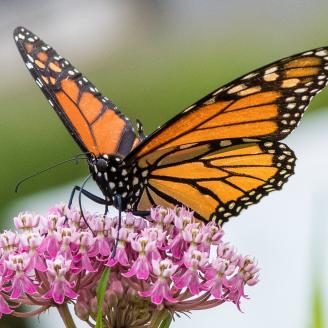
Program Availability and Accessibility to Persons with Disabilities
The Accessibility Statement
The USDA Natural Resources Conservation Service is committed to making its information accessible to all of its customers and employees. If you are experiencing accessibility issues and need assistance, please call the USDA Service Desk at 1-800-457-3642. For assistance with publications that include maps, graphs, or similar forms of information, you may also wish to contact your state or local office.
- USDA Accessibility Statement
- DR 4300-008, USDA Reasonable Accommodation and Personal Assistance Service Directive
Reasonable Accommodations and Personal Assistance Services
USDA is committed to an inclusive workplace environment where individuals with disabilities can quickly and easily request and obtain reasonable accommodation and personal assistance services.
This website complements Departmental Regulation, 4300-008, Reasonable Accommodation and Personal Assistance Services. It highlights statutory and policy guidance, processes, and procedures to utilize for providing reasonable accommodations to qualified employees and applicants with disabilities and personal assistance services to qualified employees with targeted disabilities.
- Request for Reasonable Accommodations Fillable Form
- FPAC-PM 4300-001, Reasonable Accommodation Procedures
The USDA TARGET Center
The USDA TARGET Center can convert USDA information and documents into alternative formats, including Braille, large print, video description, diskette, and audiotape. For more information, visit the TARGET Center's web site or call (202) 720-2600 (Voice/TTY).
Non-Discrimination Statement
The USDA non-discrimination statement
In accordance with Federal civil rights law and U.S. Department of Agriculture (USDA) civil rights regulations and policies, the USDA, its Agencies, offices, and employees, and institutions participating in or administering USDA programs are prohibited from discriminating based on race, color, national origin, religion, sex, disability, age, marital status, family/parental status, income derived from a public assistance program, political beliefs, or reprisal or retaliation for prior civil rights activity, in any program or activity conducted or funded by USDA (not all bases apply to all programs). Remedies and complaint filing deadlines vary by program or incident.
Persons with disabilities who require alternative means of communication for program information (e.g., Braille, large print, audiotape, American Sign Language, etc.) should contact the responsible Agency or USDA's TARGET Center at (202) 720-2600 (voice and TTY) or contact USDA through the Federal Relay Service at (800) 877-8339. Additionally, program information may be made available in languages other than English.
To file a program discrimination complaint, complete the USDA Program Discrimination Complaint Form, AD-3027, found online at How to File a Program Discrimination Complaint and at any USDA office or write a letter addressed to USDA and provide in the letter all of the information requested in the form. To request a copy of the complaint form, call (866) 632-9992. Submit your completed form or letter to USDA by: (1) mail: U.S. Department of Agriculture, Office of the Assistant Secretary for Civil Rights, 1400 Independence Avenue, SW, Washington, D.C. 20250-9410; (2) fax: (202) 690-7442; or (3) email: program.intake@usda.gov.
USDA is an equal opportunity provider, employer, and lender.

Mississippi EQIP Local Work Group Meeting
Mississippi State Office
Popular Conservation Topics
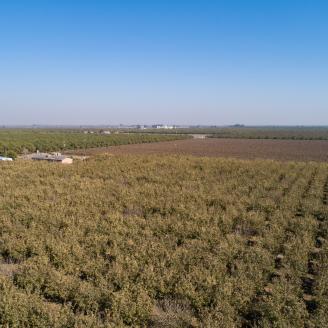
MS NRCS Employee Links!
NRCS Employee Web Resources
- AgLearn
- Cart
- Concur Travel System
- ConnectHR
- Conservation Desktop
- eDirectives System
- eForms
- Employee Personal Page
- EmpowHR
- Exhibits & Displays
- FA Tracker
- FMI document management system
- FOTG - Field Office Technical Guide
- FSA Compliance Review System
- My FPAC website
- National Planning Procedures Handbook
- National Handbook of Conservation Practices
- National Publications & Distribution Center (previously LANDCARE)
- NEST (Easements Staging Tool)
- NFC - National Finance Center
- ProTracts
- PRS – Performance and Results Measurement System
- Receipt for Service
- Resource Stewardship (RSET)
- Science & Technology Training Library
- SCIMS
- Soil Resources
- Thrift Savings Plan
- Vehicle Management Tool
- WebTA
- Mississippi SharePoint
- Flickr
Employment
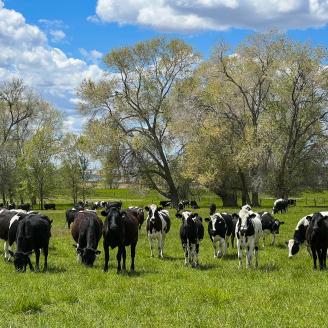
NRCS Mississippi Newsroom
The latest news releases, newsletters, success stories, publications/fact sheets, and all other media-related content
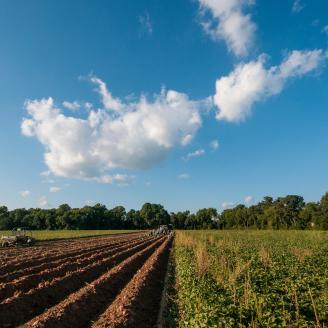
Mississippi Soils, Engineering, & Technical Resources
Soils, Engineering, Ecological Sciences & other technical resources

Earth Team Volunteers. Volunteer Today!
Since 1985, Earth Team volunteers have provided a valued source of talent to NRCS. These dedicated volunteers work with conservation professionals on private lands to improve soil quality, conserve water, improve air quality and enhance wildlife habitat.

Subscribe to Mississippi NRCS News
To sign up for updates or to access your subscriber preferences click here: https://public.govdelivery.com/accounts/USDAFARMERS/subscriber/new?topic_id=USDAFARMERS_3156
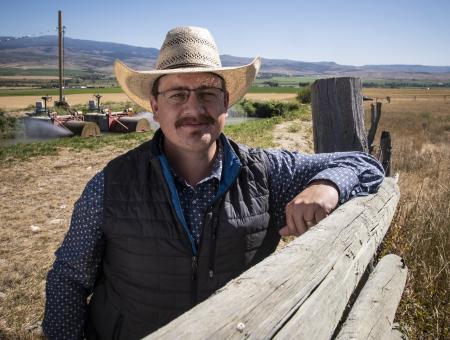
State Payment Schedule
NRCS provides financial assistance for selected conservation practices. The availability and amount of financial assistance can vary between states.
Civil Rights Committee
The National Civil Rights Advisory Committee to the Chief (NCRACC) is designed to provide management officials and employees with counsel and advice to enhance and ensure compliance with their equal employment opportunity and program delivery responsibilities.
State Technical Committee
State Technical Committees serve in an advisory capacity to the Natural Resources Conservation Service (NRCS) and other agencies of the U.S. Department of Agriculture (USDA) on the implementation of the natural resources conservation provisions of Farm Bill legislation.
How to Get Assistance
Do you farm or ranch and want to make improvements to the land that you own or lease?
Natural Resources Conservation Service offers technical and financial assistance to help farmers, ranchers and forest landowners.
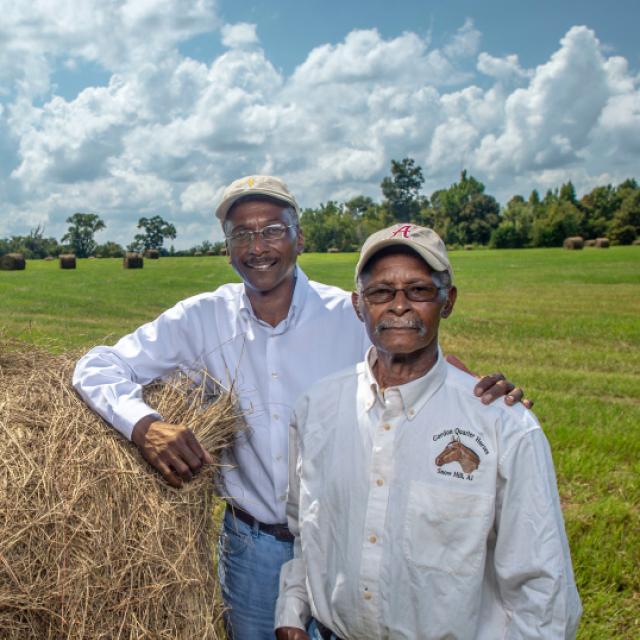
To get started with NRCS, we recommend you stop by your local NRCS field office. We’ll discuss your vision for your land.
NRCS provides landowners with free technical assistance, or advice, for their land. Common technical assistance includes: resource assessment, practice design and resource monitoring. Your conservation planner will help you determine if financial assistance is right for you.
We’ll walk you through the application process. To get started on applying for financial assistance, we’ll work with you:
- To fill out an AD 1026, which ensures a conservation plan is in place before lands with highly erodible soils are farmed. It also ensures that identified wetland areas are protected.
- To meet other eligibility certifications.
Once complete, we’ll work with you on the application, or CPA 1200.
Applications for most programs are accepted on a continuous basis, but they’re considered for funding in different ranking periods. Be sure to ask your local NRCS district conservationist about the deadline for the ranking period to ensure you turn in your application in time.
As part of the application process, we’ll check to see if you are eligible. To do this, you’ll need to bring:
- An official tax ID (Social Security number or an employer ID)
- A property deed or lease agreement to show you have control of the property; and
- A farm number.
If you don’t have a farm number, you can get one from USDA’s Farm Service Agency. Typically, the local FSA office is located in the same building as the local NRCS office. You only need a farm number if you’re interested in financial assistance.
NRCS will take a look at the applications and rank them according to local resource concerns, the amount of conservation benefits the work will provide and the needs of applicants. View Application Ranking Dates by State.
If you’re selected, you can choose whether to sign the contract for the work to be done.
Once you sign the contract, you’ll be provided standards and specifications for completing the practice or practices, and then you will have a specified amount of time to implement. Once the work is implemented and inspected, you’ll be paid the rate of compensation for the work if it meets NRCS standards and specifications.





